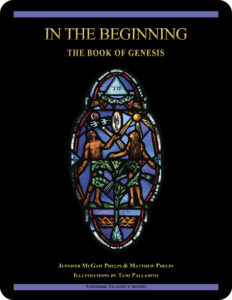 In the Beginning:
In the Beginning:
The Book of Genesis
Lesson 22 Joseph Is Sold into Slavery by His Brothers
the book of Genesis 37:1–36
Revised Standard Version Catholic Edition (RSVCE)*
New American Bible Revised Edition (NABRE)*
Catechism of the Catholic Church
ex libris (in our library)
cross references in the book of Genesis
next lesson: Judah & Tamar; Joseph & Potiphar’s Wife
This material coordinates with Lesson 22 on pages 120–123 in the study book In the Beginning: The Book of Genesis.
“And God saw everything that he had made, and behold, it was very good. And there was evening and there was morning, a sixth day. Thus the heavens and the earth were finished, and all the host of them. And on the seventh day God finished his work which he had done, and he rested on the seventh day from all his work which he had done.”—the book of Genesis 1:31—2:2
welcome to our in-depth study of the book of Genesis
We invite interested groups and individuals to check out the sample first lesson from this 28-lesson  Turning to God’s Word Catholic Bible study.
Turning to God’s Word Catholic Bible study.  These online study pages link to our free lesson video overviews as well as to a list of cross references in the biblical text. Other study aids include maps, charts, illustrations, additional commentary, and prayers based on the primary Scripture in each lesson. In the Beginning: The Book of Genesis has been granted an imprimatur and can be purchased from our website shop. If you have a Bible-study question or comment, click on one of the “ask us your question” or “what do you think” buttons on any online study page.
These online study pages link to our free lesson video overviews as well as to a list of cross references in the biblical text. Other study aids include maps, charts, illustrations, additional commentary, and prayers based on the primary Scripture in each lesson. In the Beginning: The Book of Genesis has been granted an imprimatur and can be purchased from our website shop. If you have a Bible-study question or comment, click on one of the “ask us your question” or “what do you think” buttons on any online study page.
open with prayer
It’s always wise to begin any Bible study with prayer, whether reading the Scriptures alone or meeting with others in a discussion study group. You can pray using your own words or use one of the opening prayers on our website. We especially like the following:
Lord Jesus, you promised to send your Holy Spirit
to teach us all things.
As we read and study your word today,
allow it to touch our hearts and change our lives. Amen.
let’s review—the book of Genesis 35:1—36:43
In Lesson 21 The Birth of Benjamin & Death of Rachel, Jacob is told by God to journey Bethel, where he first encountered God. Before Jacob leaves with his family, he requires that everyone with him put away all foreign gods. The LORD protects Jacob and his entourage as they travel, and when Jacob reaches Bethel he builds an altar to God. While they are at Bethel, Rebekeh’s nurse Deborah dies and is buried there. God reappears to Jacob, blessing him and changing his name to Israel. The company moves on, and Rachel goes into labor near Ephrath (Bethlehem), delivering Jacob’s twelfth son, Benjamin, before dying. The biblical text includes a genealogy of Jacob’s sons. Jacob next goes to Mamre, where his father Isaac dies. Jacob and Esau see to his burial. The thirty-sixth chapter presents genealogies pertaining to Esau, whose line will fall out of the spotlight moving forward. A chart showing the direct descendants of Jacob and Esau is on page 118 in the study book In the Beginning: The Book of Genesis.
map notes—dangerous sibling rivalry
Many people are familiar Andrew Lloyd Webber’s popular musical Joseph and the Amazaing Technicolor 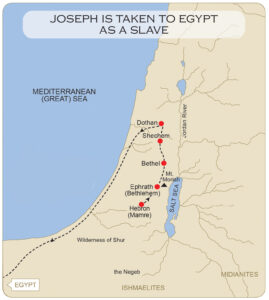 Dreamcoat. Some of Tim Rice’s rhyming lyrics are particularly memorable. Who can forget “If you ever find yourself near Ramses, get down on your knees” or Joseph announcing his plans for his brothers: “I will now take them all for a ride. After all, they have tried fratricide”? The lyrics are amusing, but fratricide isn’t. It’s worth noting that all of Joseph’s brothers aren’t on board with killing him. The map with this lesson shows the distance Joseph travels in the thirty-seventh chapter in the book of Genesis—first to where his brothers are herding sheep near Shechem, and then to Egypt after he’s been sold into slavery. Click on the map (right) to enlarge it. The original map is on page 123 in the study book In the Beginning: The Book of Genesis.
Dreamcoat. Some of Tim Rice’s rhyming lyrics are particularly memorable. Who can forget “If you ever find yourself near Ramses, get down on your knees” or Joseph announcing his plans for his brothers: “I will now take them all for a ride. After all, they have tried fratricide”? The lyrics are amusing, but fratricide isn’t. It’s worth noting that all of Joseph’s brothers aren’t on board with killing him. The map with this lesson shows the distance Joseph travels in the thirty-seventh chapter in the book of Genesis—first to where his brothers are herding sheep near Shechem, and then to Egypt after he’s been sold into slavery. Click on the map (right) to enlarge it. The original map is on page 123 in the study book In the Beginning: The Book of Genesis.
 Joseph has a prophetic dream (10:12)
Joseph has a prophetic dream (10:12)
The video overview for this lesson, “Joseph Is Sold into Slavery by His Brothers”  sets the scene for the story of Joseph, the first son born to Jacob’s favorite wife, Rachel. Joseph’s brothers dislike the special treatment that Joseph receives from his father because of this. Turning to God’s Word author Matthew Phelps points out it’s unusual that none of Joseph’s family shows surprise when Joseph tells them about his prophetic dream, although they do question the meaning Joseph assigns to the dream. It’s easy to overlook that prophetic dreams and the ability to
sets the scene for the story of Joseph, the first son born to Jacob’s favorite wife, Rachel. Joseph’s brothers dislike the special treatment that Joseph receives from his father because of this. Turning to God’s Word author Matthew Phelps points out it’s unusual that none of Joseph’s family shows surprise when Joseph tells them about his prophetic dream, although they do question the meaning Joseph assigns to the dream. It’s easy to overlook that prophetic dreams and the ability to  interpret them appear to run in Jacob’s family. This ability will prove extremely useful to Joseph later. The videos for this study are being redone and will be posted as they become available. The original videos for Lessons 4 through 28 will remain accessible until then.
interpret them appear to run in Jacob’s family. This ability will prove extremely useful to Joseph later. The videos for this study are being redone and will be posted as they become available. The original videos for Lessons 4 through 28 will remain accessible until then.
The Scripture ranges for the videos being redone to accompany this Catholic Bible study from Turning to God’s Word will match ranges for the sets of questions in the study book In the Beginning: The Book of Genesis. Viewers will be able to follow along as author Matthew Phelps discusses Lesson 22, “Joseph Is Sold into Slavery by His Brothers,” on pages 120–123 in the study book.
WHAT DO YOU THINK about the sun, the moon & the stars revolving around Joseph?
The thirty-seventh chapter in the book of Genesis reads like the beginning of a completely different book, and indeed the focus of the story dramatically shifts at this point. There are at least three things that contribute to Joseph’s unpopular position in his family.
? Can you name all three without looking at the biblical text of the thirty-seventh chapter in the book of Genesis?
 ? That his father Jacob treats Joseph differently than he treats his other sons, and that Joseph is a tattletale, are two things that certainly don’t endear Joseph to his brothers. But the most serious of Joseph’s offenses appears to be tied to his dreams. Why do you think it is that Joseph tells his family about his dreams?
? That his father Jacob treats Joseph differently than he treats his other sons, and that Joseph is a tattletale, are two things that certainly don’t endear Joseph to his brothers. But the most serious of Joseph’s offenses appears to be tied to his dreams. Why do you think it is that Joseph tells his family about his dreams?
? Consider the possibility that instead of being something of a brat, Joseph might merely be acting out of youthful innocence when he discloses the nature of his dreams.
? What valid reason might Joseph have had for reporting on his brothers’ actions to their father?
? Consider whether Joseph is in any way responsible for his father giving him a robe with sleeves.
? How have dreams previously played a part in the lives of the patriarchs Abraham, Isaac, and Jacob?
? Why do you think that no one challenges interpretations of Joseph’s dreams?
? What is there about the dream interpretations that disturbs Joseph’s brothers?
? In the book of Genesis 37:10, what’s unusual about the interpretation Jacob applies to Joseph’s dream about the sun, moon, and stars?
? Since Jacob rebukes Joseph and pooh-poohs his dreams, why do you the biblical text records that Jacob keeps Joseph’s dream in mind?
 slave—you could look it up in our archives
slave—you could look it up in our archives
How do “slavery” and “servitude” differ, and how do they figure into the Blessed Virgin Mary’s fiat (Latin for “let it be done”) in the Gospel According to Luke 1:30? To find out, read Lost in Translation, an online column in which Turning to God’s Word author Matthew Phelps helps readers connect with ideas expressed in the original languages of the Scriptures. New Lost in Translation entries are posted on Mondays, and past entries are archived on our website. Contact us if you’d like to receive Lost in Translation by email every week.
two unanswered questions
Joseph’s brothers plan to kill him and throw his body into a nearby pit. Reuben, the eldest, suggests that instead they throw Joseph alive into the pit. A little later, Judah suggests that they instead sell Joseph to traders passing by, and the brothers do this. The biblical text is unclear on a couple of points. Reuben appears not to be with the brothers when Joseph is sold. The traders to whom Joseph is sold initially are referred to as Ishmaelites, but apparently some Midianite traders also pass by. When naming the traders to whom Joseph is sold, the book of Genesis toggles back and forth between these two groups. In the thirty-seventh chapter, the biblical text seems to settle on the idea that it’s Midianites who sell Joseph as a slave in Egypt. The book of Genesis 39:1, however, indicates that it’s the Ishmaelites.
 more what-do-you-think questions
more what-do-you-think questions
Although the biblical text doesn’t spell it out, there’s a plausible reason why Reuben argues against killing Joseph. The book of Genesis 37:22 explains that Reuben plans to return later to rescue Joseph from the pit. In the book of Genesis 37:29–30, Reuben is distraught when he learns that Joseph has been sold. There are a variety of reasons that might be causing Reuben to be so upset when his plan to rescue Joseph falls apart; it seems unlikely that a fondness for Joseph is one of them.
? What do you think might be motivating Reuben’s distress?
? About that musical … How much do you think that your interpretation of the story of Joseph might be tied to the way the biblical text is represented in the familiar musical Joseph and the Amazing Technicolor Dreamcoat?
t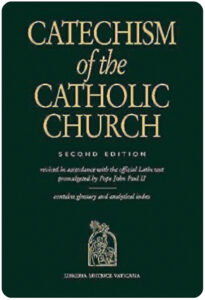 he best Catholic commentary about Scripture
he best Catholic commentary about Scripture
To find out more about how Church teaching is supported by Scripture passages in In the Beginning: The Book of Genesis, check out the Index of Citations in the Catechism of the Catholic Church. Links (Revised Standard Version Catholic Edition [RSVCE*]) to the primary Scripture passages in the lesson and relevant paragraphs in the Catechism are provided here. Not every passage in the biblical text for this Catholic study is referenced in a Catechism paragraph, however, including the passage in this lesson from the book of Genesis 37:1–36.
to learn more, read more Scripture
If you’re having difficulty with a particular passage of Scripture, it can be helpful to read the relevant  cross references—but looking these up can take time. To make that easier, we’ve compiled the cross references from the Revised Standard Version Second Catholic Edition (RSV2CE)—the translation that we reprint in our study books. That list can be found at the top of every online study page, and it includes links to cross references in the primary biblical text for In the Beginning: The Book of Genesis.
cross references—but looking these up can take time. To make that easier, we’ve compiled the cross references from the Revised Standard Version Second Catholic Edition (RSV2CE)—the translation that we reprint in our study books. That list can be found at the top of every online study page, and it includes links to cross references in the primary biblical text for In the Beginning: The Book of Genesis.
don’t forget about our indexes & extra online material

 If you’re trying to locate information about a specific Scripture passage, you can look it up in the index at the back of the study book or sample lesson. If you want to find a particular commentary, you can look up its title in the topics index. To learn more about another book of the Bible for which there’s a Turning to God’s Word study, visit the online study directories to read the commentaries and watch any accompanying videos. Finally, if you have a question or would like to make a comment about any of our studies, you can use one of the “ask us your question” or “what do you think” buttons to email our authors.
If you’re trying to locate information about a specific Scripture passage, you can look it up in the index at the back of the study book or sample lesson. If you want to find a particular commentary, you can look up its title in the topics index. To learn more about another book of the Bible for which there’s a Turning to God’s Word study, visit the online study directories to read the commentaries and watch any accompanying videos. Finally, if you have a question or would like to make a comment about any of our studies, you can use one of the “ask us your question” or “what do you think” buttons to email our authors.
ex libris—Church documents & books about religious topics
Link to magisterial documents referred to in our Bible studies at ex libris—magisterial documents.  This listing includes significant recent encyclicals as well as a number of historical Church documents. Recommended books related to Scripture study can be found at ex libris—main bookshelf.
This listing includes significant recent encyclicals as well as a number of historical Church documents. Recommended books related to Scripture study can be found at ex libris—main bookshelf.
wondering how to pronounce some of these words?
The following link is to a reading from the New International Version (NIV) Bible. To listen, open the link and click on the audio icon above the printed text. Although not taken from the translations used in our study materials, the NIV reading provides an audio guide to pronunciation of words in this lesson’s primary biblical text. A close online version of the translation of the Bible used in Catholic liturgy in the United States as well as an audio guide for daily Mass readings for the current month can be found on the website of the United States Conference of Catholic Bishops (USCCB).
the book of Genesis 37:1–36 (NIV)
 close with Bible-based prayer related to this lesson
close with Bible-based prayer related to this lesson
Many of our Catholic study groups like to conclude their discussions with a prayer based on the scriptural focus of their lesson, and some participants include Scripture-specific prayer in their individual study. If you’re uncomfortable composing your own Bible-based prayers, you can follow our four easy steps. If you prefer, you can use the following prayer based on this lesson’s text from the book of Genesis.
O God, through Joseph’s dreams you gave him a glimpse
of a future in which he would wield power and authority.
What you didn’t show Joseph in his dreams
was the hardship he first would endure.
Help us to trust in the goodness of your plan for us
even when we’re beset by difficulties beyond our control.
We ask this in the name of Jesus Christ,
whose submission to your divine plan
opened the possibility of eternal life for all humanity. Amen.
Lesson 23 Judah & Tamar; Joseph & Potiphar’s Wife—the book of Genesis 38:1—39:23
Lesson 21 The Birth of Benjamin & the Death of Rachel—the book of Genesis 35:1—36:43
you also may like our two-part study of the prophets
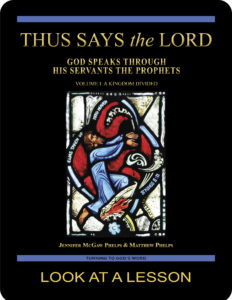
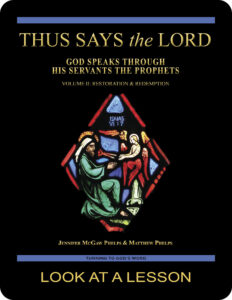 Thus Says the LORD: God Speaks Through His Servants the Prophets—Volume I: A Kingdom Divided examines the prophets in their historical context using the First and Second Books of the Kings and other Old Testament passages written before the Babylonian Exile in 586 B.C. Volume II: Restoration & Redemption looks at the post-exilic prophets. This 51-lesson Catholic Bible study builds on The United Kingdom of Israel: Saul, David & Solomon Foreshadow Christ the King. Click on the books’ covers to view a sample lesson from each volume.
Thus Says the LORD: God Speaks Through His Servants the Prophets—Volume I: A Kingdom Divided examines the prophets in their historical context using the First and Second Books of the Kings and other Old Testament passages written before the Babylonian Exile in 586 B.C. Volume II: Restoration & Redemption looks at the post-exilic prophets. This 51-lesson Catholic Bible study builds on The United Kingdom of Israel: Saul, David & Solomon Foreshadow Christ the King. Click on the books’ covers to view a sample lesson from each volume.
start a Turning to God’s Word Bible study
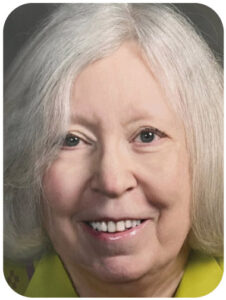 Thank you for your interest in our study In the Beginning: The Book of Genesis.
Thank you for your interest in our study In the Beginning: The Book of Genesis.  Information about beginning a Turning to God’s Word Catholic Bible study can be found at start a Bible study. Tami, Matthew, and I are available to answer questions and offer support. Contact us if you’d like to start a Turning to God’s Word study or have your schedule listed with other TtGW study groups on our website. —Jennifer
Information about beginning a Turning to God’s Word Catholic Bible study can be found at start a Bible study. Tami, Matthew, and I are available to answer questions and offer support. Contact us if you’d like to start a Turning to God’s Word study or have your schedule listed with other TtGW study groups on our website. —Jennifer
*There are seven deuterocanonical books in the Old Testament—the Books of Tobit, Judith, Wisdom, Sirach, Baruch, and First and Second Maccabees, as well as some passages in the Books of Esther and Daniel. Protestants usually refer to these works as “apocryphal,” a word that means “outside the (Protestant) canon” because they’re excluded from most Protestant Bibles. The word “deuterocanonical” means “second canon”; Catholics use that word to refer to any section of the Catholic Old Testament for which there are no extant, or existing, Hebrew manuscripts. All of the deuterocanonical books appear in the Septuagint, the earliest remaining versions of which date to the 1st century B.C. This Greek translation of the Old Testament was in common use by Jews at the time of Jesus—but the same books aren’t found in existing Hebrew manuscripts, which aren’t as old as the oldest version of the Septuagint. Learn more by reading How Do Catholic & Protestant Bibles Differ?
Turning to God’s Word printed Bible studies use the 2006 Revised Standard Version Second Catholic Edition (RSV2CE) translation for all Scripture references except those to the Psalms, which are taken from The Abbey Psalms and Canticles, prepared by the Benedictine monks of Conception Abbey and published in 2020 by the United States Conference of Catholic Bishops (USCCB). All Scripture links for the online study pages for In the Beginning: The Book of Genesis are to the 1966 Revised Standard Version Catholic Edition (RSVCE) translation. The New International Version (NIV) audio recordings follow the same chapter and verse numbering as the RSV Catholic translations, but the NIV translation doesn’t include the deuterocanonical books and passages.
The 1966 RSVCE uses archaic pronouns and verb forms such as “thee,” “thou,” “didst” in the Psalms and in direct quotations attributed to God. The 2006 RSV2CE replaces those with more accessible English. The few significant translation changes in the RSV2CE include rendering almah as “virgin” in the Book of Isaiah 7:14 and restoring the term “begotten” in the Gospel According to John 3:16.
Numbering varies for some passages in this Bible study. Turning to God’s Word studies (print and digital) follow the numbering in the Revised Standard Version Catholic translations (RSV2CE and RSVCE). Discrepancies in the New American Bible Revised Edition (NABRE) are noted in the Index of Scripture Citations in the study book and the online sample.
 You can learn more about the Psalms by viewing a sample lesson from the Turning to God’s Word Catholic Bible study Sing a New Psalm: Communicating with God Through the Prayers of the Church—Volume I: Lauds & Vespers. The second part of that study, Sing a New Psalm: Communicating with God Through the Prayers of the Church—Volume II: Vigils, Day Prayer & Compline, is scheduled for publication in 2025. Some verse numbers may vary in different translations of the Psalms.
You can learn more about the Psalms by viewing a sample lesson from the Turning to God’s Word Catholic Bible study Sing a New Psalm: Communicating with God Through the Prayers of the Church—Volume I: Lauds & Vespers. The second part of that study, Sing a New Psalm: Communicating with God Through the Prayers of the Church—Volume II: Vigils, Day Prayer & Compline, is scheduled for publication in 2025. Some verse numbers may vary in different translations of the Psalms.
